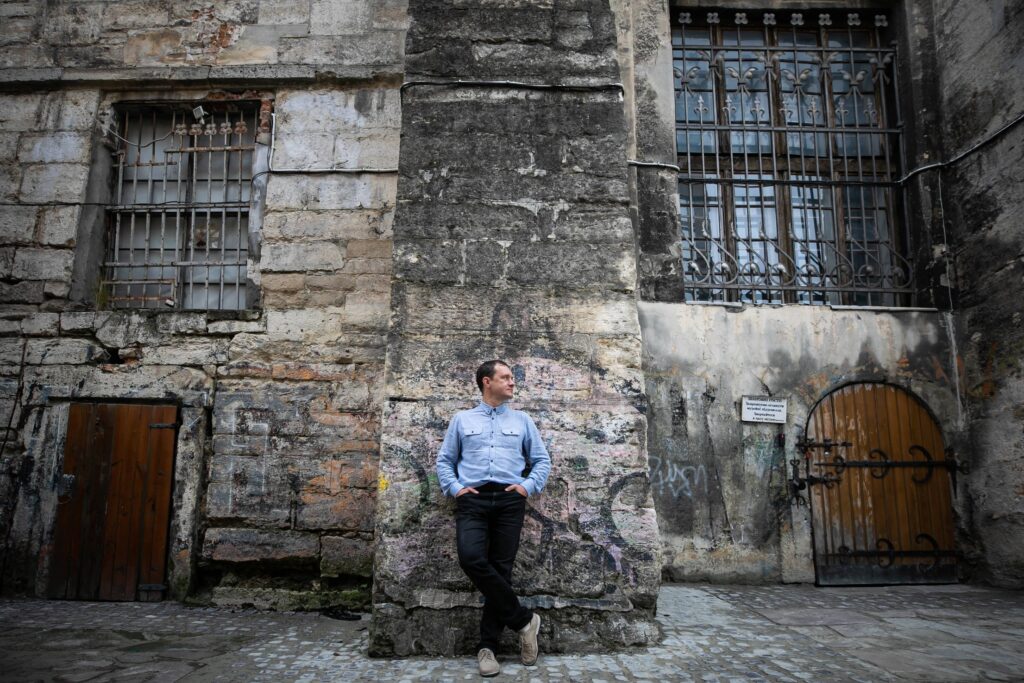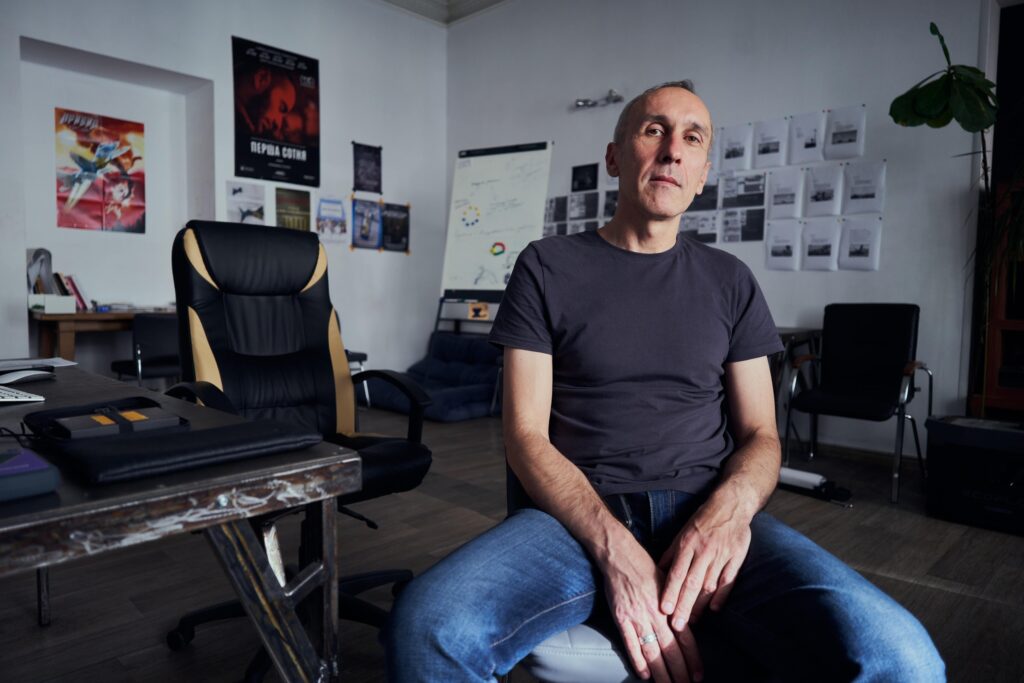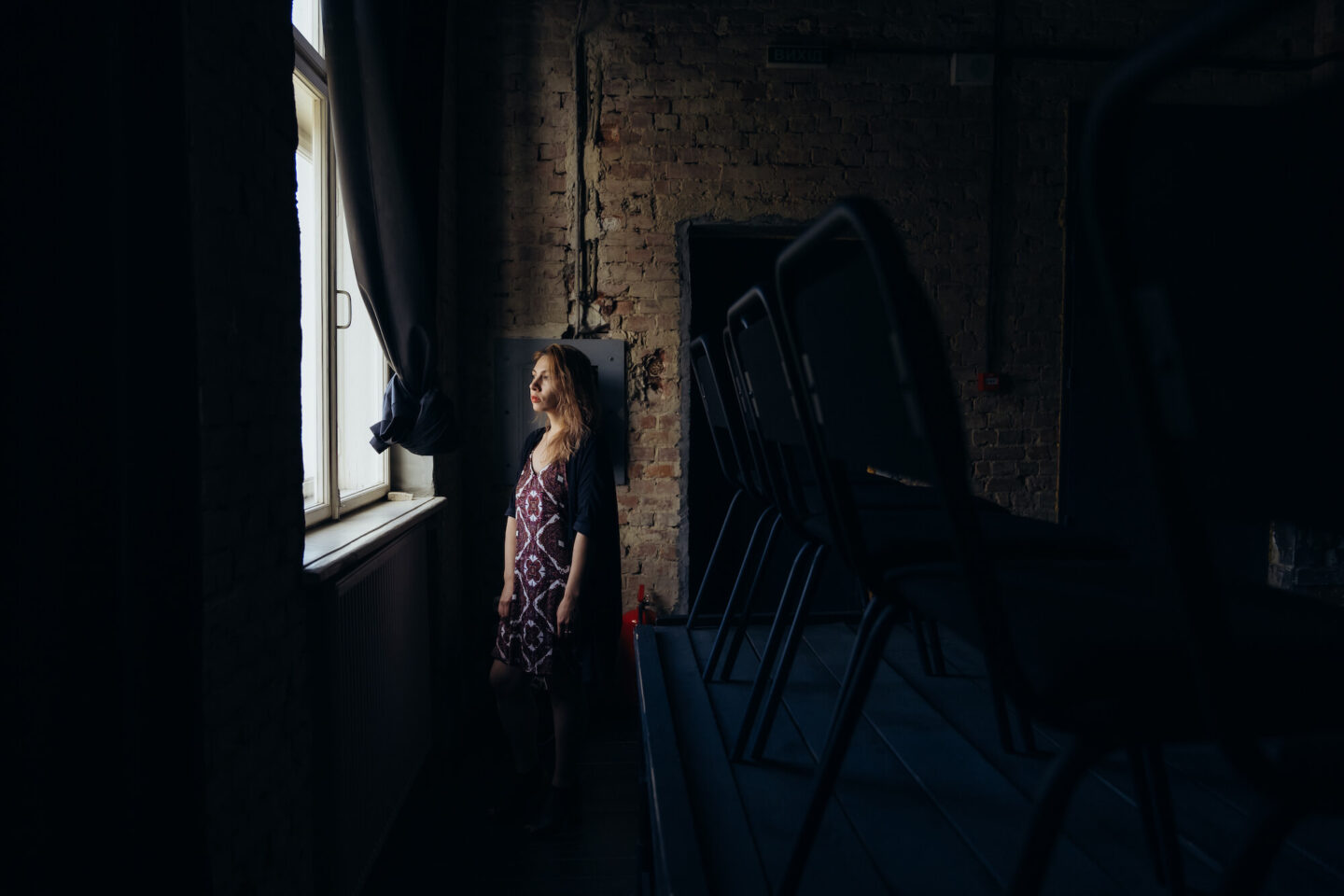The Ukrainians Media is an award-winning independent media company focusing on high-quality, long-form, and visual journalism. Our mission is to foster positive social changes in Ukraine.
This story was created thanks to the support of our readers. Please join The Ukrainians Community on Patreon and help us publish more important and interesting stories.
It’s March again. My friend and I are smoking on the porch of the same old green wooden house deep in a one-story neighborhood in central Chernihiv—the same one we smoked on a year ago. We are still here. Why, actually? It’s not that we do not have a place to go. We still have a place not to leave.
From the third step, I see the same apartment buildings I saw a year ago. Only now, their windows are glowing in shades of yellow, orange, and coffee. A year ago, only a few windows there were stubbornly lit at first, but then they went out like candles that someone blew on from above, where the Russian fighter jets were racing, among other things.
There were dozens of jets, but in my mind, they all merged into a single giant one. Like a bird of prey hovering over the city, casting a shadow over the whole of it with just one wing.
Thump, snap, whoosh—the candles of the windows succumbed to the bitter, dark breath. I memorized all the windows and the order in which they stopped glowing. The city sank into darkness incomparable with the darkness of the night.
We are smoking on the porch, just like that night when we strained to hear every rustle and peered into the red glow of the city. The sky shimmered scarlet, pink, and red behind us, behind the garden, on the background of the twisted branches of apple trees that no one cared about this spring. A beautiful glimmer of terrible night fires.
We pull at the red dots of cigarettes, searching for the right words. But we cannot find any.
It is March again. For the first time, I notice how many people go to the pine forest in the middle of the city carrying red roses, carnations, and tulips that have just bloomed. This is how it will be from now on: in the disheveled days of March, rainy or snowy or sunny or chilly.
People go there to visit their loved ones, their dead. Throughout March they were burying them in long trenches dug by an excavator next to the cemetery, which had not been used for half a century.
They buried them there because they could not reach the city cemetery. The Russian troops shelled it for months—they shelled our dead.
Today the forest cemetery is cleaned up and does not look like it did last spring. There are no rows of wooden plaques, no inscriptions made with sharpies, no numbers, no remnants of names washed away by rain and snow, and no missing dates. Now there are crosses, gravestones, fences, and benches drowning in flags and flowers. Three red apples on a saucer, two cigarettes on the damp ground, and even a box of matches. Life honors this untimely death here, half a kilometer from where the children would jump into a warm river at the forest’s edge in a few months. We went there recently with our friends, walking our dogs. One of the girls suddenly grabbed her backpack and said she would visit her father quickly. Someone did not even understand what she was talking about. Only later did they.
The moment the figure of the girl disappeared behind the pines, I realized what I was still doing there.
***
A shaky tightrope is stretched between “I’m not going” and “Let’s go,” “I won’t leave again” and “Let’s leave; it’s the last chance.” But I can not walk that tightrope. Neither the one stretched between two trees in the city park nor between decisions. There are no right or wrong decisions. There is only a crude decision and an inevitable result.
I left Chernihiv for the first time on the night of February 25, although I claimed I never would. Empty trunk, an empty head, the dead of the night, and a bright Venus – when it was just rising, I thought it was a drone, a fighter jet, a rocket, whatever, but no star rising over my escape.
On March 3, I returned to Chernihiv for the first time. This trip lasted two days, with an anxiety-filled overnight stay in Kaniv, where I could finally breathe as if I were at home. We hurried along the highway from Kyiv to Chernihiv, past fallen trees cut by missile fragments, past shot-down cars, without fear, because I longed so much to return to the city that the Russians wanted to take. I wanted to take it, too. To embrace and comfort it.
I felt like a tree uprooted and thrown away. And there was no other soil for me. No other place.
But the tightrope remained taut—and in the middle of March, I fled again. The wheels of the car sank into the March mud. We drove across fields, someone’s vegetable patch, between the tails of rockets, to the spurts of gunfire, in the haze of damp morning and intoxicating smoke. The boards of my house creaked inside me like bones. My heart pounded like a mortar shell falling with its every beat. I was scared to death—and I was on the run.
I entered my house in the first days of April, shortly after the Russians withdrew. And here I am now—always, every single day. My house has patches under its concrete ribs; it is in the cast but stands on its own feet. I sit behind its ribs and no longer feel like walking the tightrope.
***
As we drove slowly through Chernihiv in March, when the city was about to be besieged, I looked through the window at every tree, every bend and curve, at the charred black walls, the deep craters that would fit a human, and the scenes of recent fires. It seemed as if the city I knew had been recorded on a cassette tape, and someone was pressing the button that would destroy the tape forever. They were preparing it to record something new. Would there be a place for me there? And if so, for which version of me?
The boundary beyond which the loss of a home would be irreversible was fast and relentlessly approaching. Someone was hitting the erase button, and I had no idea how to stop it. In those days, I lost everything—my home, my people, my own self. My bright jacket turned black from the earth and the basements, my pink face turned pale, and the city’s light shriveled, withered, and faded.
How would the Russians have spoken about the city if they had taken it? What would they have appropriated? What would have happened to me if they had announced that plakhtas, vintage woven skirts kept at the museum, embroidered towels, Cossack weapons, and pagan temples belonged to them? Who would I have remained? Where would I have belonged?
And then the landscape astonished me. Something inhuman, unreal. A metaphor at arm’s length. It was a monument sign at the entrance to Chernihiv—the one I see every time I come home. “Chernihiv. 1,300.” A Ukrainian tank stood beneath the bullet-riddled red letters. At that moment, something clicked in the historic cassette player, and the cassette, seemingly erased, began to reclaim its voice. That was the meaning of it. Chernihiv. 1,300 years old.
About two thousand days ago, I was asked in the middle of the night why I considered myself Ukrainian. I said that the blood of the people who’d lived before us trickled under my feet through the centuries. I just forgot about it, frightened by the shadow of the wing of a bird of prey.
***
My Chernihiv is not made of buildings, good salaries, beautiful streets, low rents, parks and lush greenery, shorter kindergarten wait lists, or easy commute to the capital.
My Chernihiv is made of stories, characters, colors, and rhythm. Love for a place is, in some ways, comparable to love for a person. I cannot choose a place to live by myself. I wish I could love Uzhhorod, but my heart says: love is right here. So this is my place. My tower, where it seems I am forced to stay, but the door is open.
There is no appropriate word to explain why I long to stay here. It’s just that I still have the possibility of staying.
***
It’s been a year since the two furrows of the tank tracks have been imprinted along the clearing next to my house in the middle of a birch grove. In the fall, the tracks filled with water and turned into two streams, two rivulets without a clear beginning or end. Children placed paper boats made of pages torn out of notebooks on these twin streams. The breeze slowly pushed them forward along the tank’s route. The winter that hid these tracks under the snow passed. The snow melted, but the rivers stayed. And I am staying, too.
I still wonder – why? What keeps me here and makes me force my way into this city? And what about the others? Last spring, the freshly tilled soil loomed black in the suburbs, mutilated by bombs and shells, among the ruins and charred buildings, but here and there, sprouts were already turning green. Because the neighbor of a woman who had been killed in her own yard had come out of the basement for the first time and had sown the favorite flowers of the deceased in the garden. And they, the neighbors, had been arguing for years. Because between the two walls of the car repair shop, which stand untouched and where the chalk scribbles of the last year are still visible, I see an old mechanic who started repairing Ukrainian heavy machinery in March and seemed to have lost everything. Because Sashko, an old man who survived a stroke, is walking towards me again—he guarded our street with a rifle and blinked whenever he walked towards me, pretending that my beauty blinded him. Because Khrystyna from the building next to ours, who used to share cigarettes with me, no longer greets me just as she never did, finding me arrogant.
***
I drive yet again past the car that belonged to Volodymyr Andriychenko, a combat medic. His last trip to the front line outside the city was fatal.
The burned-out, bullet-riddled cars sat along that road for the first few months. But later, they disappeared, one by one; they vanished; they were removed, hauled away. But Volodymyr’s car is still here. I guess they do not remove it because this car is his monument. A monument to his cause. In a year, it has shriveled and withered—its steel body pierced by hundreds of shell fragments.
I pass it every time I come home from my parents’ or mother-in-law’s house. Knowing this, I always take flowers to put there. There are already more than enough. But I just cannot help but do it whenever I drive by.
What am I actually doing here? Why do I stay when there seems to be a normal life elsewhere?! Shame and fear. Because someone would never return here the way they wanted to.
Meanwhile, it’s March again, and we are smoking on the same porch. Because we ran away. And we do not want to repeat this.
So if I ever had to take my heart out, I would leave it here. Among these people, these streets, these tracks. Because the heart does not obey desires but can bow to fear.
Vira Kuryko, writer, journalist.
Translated by Hanna Leliv.
The Ukrainians Media is an award-winning independent media company focusing on high-quality, long-form, and visual journalism. Our mission is to foster positive social changes in Ukraine.
This story was created thanks to the support of our readers. Please join The Ukrainians Community on Patreon and help us publish more important and interesting stories.




